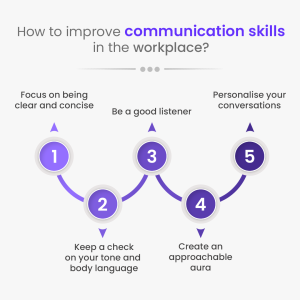
Effective communication is the cornerstone of a thriving and productive workplace. It is a fundamental pillar of success, fostering meaningful communications and strengthening team relationships.
Effective communication is a skill. It nurtures a positive and cooperative environment at the workplace. Often employees fail to communicate their problems, brainstorm ideas and put forward their suggestions, resulting in a backlog of tasks and projects needing due attention from managers. As a result, decision-making processes slow down.
Thus, it is the duty of managers to establish better communication habits within the team by helping their employees improve their communication skills and be better at brainstorming ideas.
How to Improve Communication Skills in the Workplace?
The success and failure of any business depends on their team’s abilities to communicate clearly, effectively and in alignment with business goals.
Interestingly, effective communication skills are easy to build! Here’s how you can master workplace communications:
1. Focus on being clear and concise

Positive communication is essential for better business outcomes. Whenever we communicate, we assume the recipient has soaked in everything word-to-word. However, that’s never the case!
Before engaging in any communication, you need to define the goals and outcomes you wish to achieve beforehand. When you’re clear about the goals, think about how this particular recipient is going to receive this conversation.
In order to communicate effectively, it is important to keep the recipient and their values into consideration. Communication is all about clarity and word choices.
When you know what to convey and how to put it out with the right choice of words, you provide all the necessary information in the best possible way. Do not forget to reiterate the critical information. They could be distracted, who knows?
2. Keep a check on your tone and body language
Knowing what to say is important but knowing how to say it is more important! The way you communicate and brainstorm ideas, and the tone you use to get the work done from your co-workers have a very crucial impact on the outcome.
Often, external factors like stressors in your personal life affect your body language. You may be tense in your personal life but come off as rude at work, as people can only see your actions and are bound to make assumptions accordingly.
To avoid giving away unnecessary cues, you should be relaxed before engaging in particularly hard conversations. By being mindful of your body language and tone, you not only communicate effectively but also reduce the chances of miscommunication and foster trust across team members.
3. Be a good listener
Listening is an essential management skill and one of the best ways to master effective communication. When you are a good listener, you give undivided attention to the speaker and focus on what’s being said to understand the real motto behind the conversation. With active listening, the conversation turns out so much better.
To practise active listening, clear your mind’s distractions and pay full attention to what the person is saying. Take advantage of the pauses to ask some of the clarifying questions. When they end their part, rephrase what you heard to ensure that you understood their point perfectly.
4. Create an approachable aura
There are a lot of ways to communicate but when it comes to business, it is mostly formal. When dealing with your colleagues, customers and stakeholders, you need to be clear and respectful. But that doesn’t mean you cannot be friendly and approachable.
In workplace communications, being friendly and creating an open environment goes a long way.
When you’re friendly and open to suggestions, communication is easier and more effective. People find you approachable as you’re all smiles and acknowledge their suggestions. Thus, be it co-workers, customers or stakeholders, they all feel like coming and talking to you.
5. Personalise your conversations
Personalisation goes a long way in workplace communications. When you reword what’s being asked and answer accordingly, you master the power of effective communication.
This not only helps in verbal communication but also paves the way for healthy discussions in written communications with customers and stakeholders.
Reasonable care to be taken for email communications. Send a customised email keeping in mind the emotions and values of the recipient. This goes a long way in building healthier business relationships.
Conclusion
The ability of employees to communicate clearly is one of the foundations of successful businesses.
To master effective communication, you must understand where your recipient is coming from and tailor your communications according to their values and emotions. At the end of the day, only businesses with a positive communication culture succeed.
Follow me on LinkedIn
Frequently Asked Questions
Why is Effective communication important in business?
Effective communication is crucial for an organisation’s success and repo. It ensures smoother business functions, fosters teamwork and helps you build stronger relationships with customers, clients, stakeholders and employees.
What are the barriers to effective communication?
One of the common barriers to effective business communication is non-verbal cues. When your body language, facial expressions and tone of voice do not align with the spoken words, you end up conveying other emotions and intentions that were never meant to express. Extreme care should also be taken when communicating crucial matters through emails.
How to build trust through communication?
Trust is the foundation of strong business associations. When you are truthful in your communications and ensure delivery of promises, trust and transparency is built. Often, it may take you time and effort in building a professional connection and sense of reliability.




Привет. Леон не работает приложение и с чем связана данная проблема я не знаю. Но лучше поискать другой источник для скачивания данной программы. Тут тратить свое время не советую.
Привет. Почему не работает бк леон и с чем связана данная проблема я не знаю. Но лучше поискать другой источник для скачивания данной программы. Тут тратить свое время не советую.
Раскройте для себя мир вдохновения и энергии с нами! 104.5 ФМ радио Олимп — это неповторимая смесь музыки, телепрограмм и развлекательных программ, созданных, чтобы поднимать настроение и подарить порцию мотивации. На нашей волне 104,5 ФМ вы всегда будете в курсе последних новостей, насладитесь любимыми мелодиями и откройте для себя новые. Слушайте Радио Olimp и позвольте нам сделать ваш денек красочнее!
Приоткройте в себе мир вдохновения и энергии с нами! Олимп Челябинск – это уникальная смесь музыки, новостей и познавательных программ, созданных, чтобы поднимать настроение и ежедневно мотивировать. На нашей волне 104.5 ФМ оставайтесь в курсе последних событий, насладитесь любимыми мелодиями и приоткройте для себя новые. Включайте Радио Олимп и позвольте нам сделать ваш денек ярче!
Здравствуйте. Ищете где купить копию Airpods PRO? Топовые беспроводные наушники в Москве. Копия оригинальных AirPods с шумоподавлением по цене 2490 рублей. Надежные гаджеты по доступным ценам. Доставим по России.
Приветствую. Ищете где купить копию наушников Airpods PRO? Лучшие беспроводные наушники в Москве и области. Реплика оригинальных AirPods с шумоподавлением со скидкой. Самые надежные гаджеты по приемлимым ценам. Быстро доставим по России.
Всем здравствуйте. Искали где pro-buy? Наилучшие беспроводные наушники в Москве и РФ. Реплика оригинальных AirPods с шумоподавлением со скидкой. Самые надежные гарнитуры по низким ценам. Быстрая доставка по России.
Привет. В поисках где купить реплику Аирподс ПРО? Наилучшие беспроводные наушники в Москве и области. Копия оригинальных AirPods с активным шумоподавлением по цене 2490 рублей. Только качественные гарнитуры по приемлимым ценам. Доставка по России.
Приветствую. В поисках где pro-buy? Топовые беспроводные наушники в Москве и РФ. Реплика оригинальных AirPods с шумоподавлением по скидке. Только качественные гаджеты по приемлимым ценам. Доставим по России.
Приветствую. Ищете где купить копию наушников Airpods PRO? Наилучшие беспроводные наушники в Москве и РФ. Реплика оригинальных AirPods с шумоподавлением по цене 2490 рублей. Только качественные гаджеты по приемлимым ценам. Доставка по России.
Всем привет. Искали где купить реплику Airpods PRO? Топовые беспроводные наушники в Москве и РФ. Копия оригинальных AirPods с шумоподавлением со скидкой. Надежные гарнитуры по доступным ценам. Быстрая доставка по России.
Приветствую. В поисках где купить копию Аирподс ПРО? Топовые беспроводные наушники в Москве и области. Реплика оригинальных AirPods с шумоподавлением по скидке. Самые надежные гарнитуры по приемлимым ценам. Быстрая доставка по России.
Здравствуйте. Ищете где купить копию наушников Airpods PRO? Лучшие беспроводные наушники в Москве и области. Реплика оригинальных AirPods с шумоподавлением со скидкой. Надежные гаджеты по приемлимым ценам. Быстрая доставка по России.
Всем привет. Ищете где pro-buy? Лучшие беспроводные наушники в Москве. Копия оригинальных AirPods с активным шумоподавлением всего за 2490 рублей. Проверенные гаджеты по доступным ценам. Быстрая доставка по России.
Откройте двери в мир авто и возможностей с Auto-Haus! Мы – ваш компаньон в поиске подходящего автомобиля, предлагая ассортимент лучших марок и моделей на любой вкус и бюджет. Купить авто в автохаусе, где вы найдете не просто автомобильный салон, а место, где ваша желание о новом авто становится реальностью. Наши профессиональные консультанты помогут вам выбрать идеальное авто, отвечающее всем вашим ожиданиям и предпочтениям. Доверьте нам заботу о вашем следующем транспорте – салон Auto-Haus всегда готов предложить вам лучшие автомобили на рынке Беларуси.
Ищете где реплика Airpods PRO? Лучшие беспроводные наушники в Москве и РФ. Реплика оригинальных AirPods с шумоподавлением всего за 2490 рублей. Только проверенные гаджеты по доступным ценам. Доставим по России.
Привет! Предлагаю деньги в Минске рядом с вами. Вы можете получить финансирование без лишних вопросов и документов. Доступные условия заема и срочное получение в любом городе. Набирайте нам для получения подробной информации, или оставляйте заявку на сайте.
В настоящее время наши дни могут содержать внезапные издержки и экономические трудности, и в такие моменты каждый ищет надежную поддержку. На сайте займ денег вам помогут без лишних сложностей. В своей роли представителя я стремлюсь распространить эту информацию, чтобы помочь людям в сложной ситуации. Наша платформа обеспечивает прозрачные условия и эффективное рассмотрение запросов, чтобы каждый мог разрешить свои финансовые вопросы быстро и без лишних хлопот.
cost of valtrex generic
synthroid 125 mg
lisinopril 2.5 mg price
canadian pharmaceuticals online cheap
canada metformin
synthroid without a prescription
zithromax buy cheap
valtrex canada
can you buy metformin over the counter in uk
canadian pharmacy store
zithromax 2 pills
Приветствуем вас в мир ставок с БК Лига Ставок! Процесс регистрации и входа в личный кабинет созданы для максимального удобства и безопасности каждого пользователя. Бк лига ставок официальный сайт регистрация – легко и быстро, и это открывает доступ к многочисленным возможностям: от ставок на спорт до участия в акциях и получения бонусов.
Пройдите несколько простых шагов для регистрации: заполните обязательные поля формы, подтвердите свою электронную почту и номер телефона, и вы готовы к старту! После регистрации, используйте ваш новый аккаунт с помощью полученных данных – и весь мир ставок БК Лига Ставок окажется у вас под рукой.
Ваш личный кабинет – это командный пункт вашими ставками, где вы можете легко управлять своим балансом, делать ставки, просматривать историю транзакций, а также получать эксклюзивные предложения и уведомления о предстоящих событиях. Не упустите свой шанс – присоединяйтесь к БК Лига Ставок уже сегодня и начните своё путешествие в мире ставок с комфортом и уверенностью!
Анонсируем запуск новой версии мобильного приложения БК Лига Ставок для Android! Этот шаг полностью преобразует ваш досуг с ставками, делая его более понятным и эффективным. Лига ставок скачать на телефон бесплатно андроид для всех пользователей! В обновлении вы найдете свободу доступа к огромному ассортименту спортивных мероприятий из любой точки с помощью вашего устройства. Усовершенствованное управление профилем, инновационная концепция дизайна для простой навигации и увеличенная скорость работы приложения – всё это создано для вас. Присоединяйтесь к числу воодушевленных пользователей и получайте удовольствие от ставок в любой точке планеты и в любое время. Скачайте обновление приложения БК Лига Ставок уже сегодня и переходите к новому этапу игры!